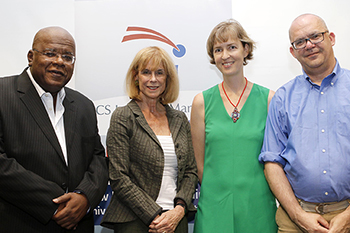Latest News Archive
Please select Category, Year, and then Month to display items
03 January 2023
|
Story Lacea Loader
|
Photo Evert Kleynhans
 Dr Dolf van Niekerk.
Dr Dolf van Niekerk.
The University of the Free State (UFS) would like to express its condolences to the family and friends of South African author, Dr Dolf van Niekerk, on his passing.
Dr Van Niekerk, the recipient of an
honorary doctorate from the UFS, passed away on 31 December 2022. The UFS awarded a Doctor of Letters to Dr Dolf van Niekerk during its April 2021 graduation ceremony.
Dr Van Niekerk was a celebrated author who also achieved fame as a dramatist and radio presenter. An alumnus of the UFS, he received a BA degree from the university cum laude in 1949. He also played a role in academia and was an emeritus professor at the University of Pretoria until his retirement in 1994. His work includes 27 books in philosophy, poetry, fiction, drama, and memoirs, for which he has received numerous awards. These include the
Eugene Marais Prize, the MER Prize, and the Scheepers Award for Youth Literature.
“Dr van Niekerk is a Kovsie alumnus with a deep connection to the Free State. He played a significant role in the country’s literary history, and it was an honour for the university to award him with an honorary degree. A wordsmith of note, Dr van Niekerk’s contributions to South African literature, radio, and stage will live on," says
Prof Francis Petersen, Rector and Vice-Chancellor.
UFS hosts first ACS Institute held on African soil
2015-12-08

The first ever Association for Cultural Studies (ACS) Institute hosted on the African continent is taking place on the Bloemfontein Campus. At the event are, from the left: Prof Jonathan Jansen, Vice-Chancellor and Rector of the UFS; Prof Jean Comaroff, Alfred North Whitehead Professor of African and African-American Studies and Anthropology at Harvard University; Prof Helene Strauss, Chair of the Department of English at the UFS; and Prof Gil Rodman, Chair of the Association for Cultural Studies and Professor of Communication Studies at the University of Minnesota.
Photo: Johan Roux
|
The University of the Free State (UFS) is hosting the 2015 conference of the Association for Cultural Studies (ACS) Institute – the first time for this international event to take place on the African continent.
From 7 – 12 December 2015, some of the world’s leading scholars in cultural studies are taking part in the conference on the Bloemfontein Campus. The event has been organised by the UFS Department of English in collaboration with colleagues from other departments in the Faculty of the Humanities.
The ACS is the foremost international association for scholars in cultural studies, and has been hosting the biennial Crossroads in Cultural Studies Conference since 2006. In 2011, the ACS held its inaugural institute at the University of Ghent (Belgium), followed, in 2013, by one at the Alpen-Adria University Klagenfurt (Austria). As the 2015 meeting of the institute is the first to be held in Africa, the organisers aim at highlighting the contributions that scholars from our continent and other (post)colonial contexts have made to cultural studies, even as it engaged many of the long-standing theoretical concerns generated for the field by scholars from the Global North.
Themed ‘Precarious Futures’, the conference explores how cultural studies might assist in charting more equitable futures by reflecting critically on the cultural, economic, and political trajectories within which precariousness – a state increasingly anticipated for the planet – might be altered. Experts in a diversity of disciplines are sharing their perspectives in the form of seminars and lectures.
Keynote lectures are delivered by Prof Jean Comaroff (Harvard University), Prof John Erni (Hong Kong Baptist University), Dr Jo Littler (City University London), Dr Zethu Matebeni (University of Cape Town), and Prof Handel Kashope Wright (University of British Columbia).
In her opening lecture on Monday 7 December 2015, Prof Comaroff addressed the challenging relationship of law, detection, and sovereignty in contemporary African polities within the South African post-apartheid context.
Topics discussed include climate change; the archives of everyday life; cross-racial intimacies; ethnography; meritocracy; cultural studies and human rights; China and globalisation; gender, sexuality, and race; and governance, embodiment and the work of care.